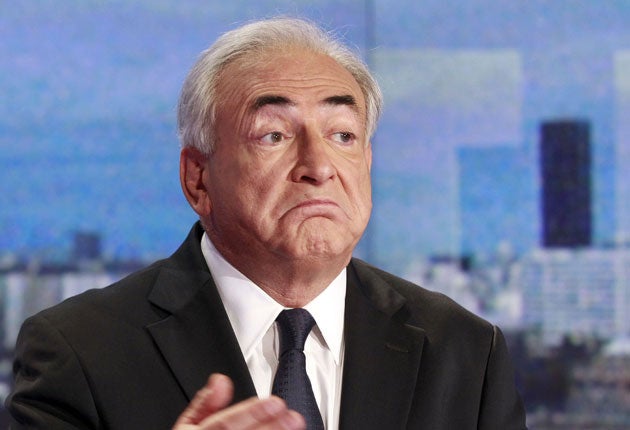Dominique Strauss-Kahn arrested in prostitution case

Your support helps us to tell the story
From reproductive rights to climate change to Big Tech, The Independent is on the ground when the story is developing. Whether it's investigating the financials of Elon Musk's pro-Trump PAC or producing our latest documentary, 'The A Word', which shines a light on the American women fighting for reproductive rights, we know how important it is to parse out the facts from the messaging.
At such a critical moment in US history, we need reporters on the ground. Your donation allows us to keep sending journalists to speak to both sides of the story.
The Independent is trusted by Americans across the entire political spectrum. And unlike many other quality news outlets, we choose not to lock Americans out of our reporting and analysis with paywalls. We believe quality journalism should be available to everyone, paid for by those who can afford it.
Your support makes all the difference.The former IMF chief, Dominique Strauss-Kahn, will spend tonight behind bars in Lille after being arrested “by appointment” to answer questions about his links with an international prostitution ring.
Mr Strauss-Kahn, 62, faces two, and maybe four, days of interrogation over his alleged participation in orgies with prostitutes in Lille, Brussels, Paris and Washington DC in 2009. A sprawling investigation into the so-called “Carlton affair” has already led to formal accusations against a senior French police officer, two hotel managers, several businessmen and a club and a brothel owner known as “Dodo la Saumure” (or Dodo the pickled mackerel).
Mr Strauss-Kahn, a former Socialist finance minister who was once favourite to win this spring’s presidential election, was first publicly linked with the investigation last autumn. He returned to France last August after American prosecutors dropped criminal charges that he had sexually assaulted a chambermaid in a Manhattan hotel in May.
Popularly known by his initials DSK, Mr Strauss-Kahn could face formal accusations of “complicity in organised pimping” and “receiving embezzled company funds”. Two businessmen, Fabrice Paskowski and David Roquet, who are known as Mr Strauss-Kahn’s “friends in the North”, are alleged to have paid for the orgies from their companies’ funds without authorisation.
DSK admits that he attended the orgies, or “swingers’ parties”, but denies any part in their organisation. Paying for sex is not illegal in France; organising paid-for sex is.
The former IMF chief says that he had no idea that the parties were funded by two large companies or that the young women present were call-girls. His lawyer, Henri Leclerc, caused offence in France in December by saying: “At these kinds of parties you're not always dressed, and I challenge you to distinguish a naked prostitute from any other naked woman.”
One of the parties, featuring young women flown in from northern France, occurred in a luxury hotel in the US capital on 11-13 May last year, the day before Mr Strauss-Kahn was accused of assaulting the chambermaid Nafissatou Diallo in the Manhattan Sofitel.
DSK has been asking for months to meet gendarmerie investigators to give his side of the “Carlton affair” (named after the top hotel in Lille alleged to have been the epicentre of the call-girl ring). To avoid arrest in front of TV cameras, he travelled by appointment to Lille yesterday and was placed in “garde à vue”, or custody, for 48 hours with a possible extension for another 48 hours.
Mr Strauss-Kahn’s prosecution is far from certain. Investigators may decide that, even if he knew that the women were call-girls, there is no proof that he organised the events. It could also be difficult to prove that he knew that the parties were financed with embezzled funds.
The two companies involved include a subsidiary of the large construction firm Eiffage, descended from the company which built the Eiffel Tower. The executives, since dismissed, insist that the payments were approved by higher management.
They say that it was regarded as a legitimate “entertainment” expense to establish links with a senior politician who might be the next President of the Republic. Both companies dismiss these claims.
Witness statements by the call-girls have been widely leaked in the French press in the last few days. The women were allegedly recruited through Dominique Alderweireld, “known as Dodo la Saumure”, a Frenchman who operates legal brothels in towns on the Belgian side of the Franco-Belgian border. (Saumure is the kind of brine used to pickle mackerel, which is a French slang word for pimp.)
Mounia R., 38, said that she flew to Washington to take part in parties with DSK for €2,400 a weekend. She said that she had also consented to a “violent” sexual encounter with DSK on another occasion for €900. “Everyone present must have been well aware that I was being paid,” she told investigators.
Another woman, Florence V., said that she was “almost sure” that DSK assumed that she was an unpaid libertine, not a prostitute. “We saw DSK twice at the Hotel W (a luxury hotel close to the White House in Washington) in mid May 2011,” she told investigators. “I made love to DSK on each of these occasions…He was very charming with the women present. He was never violent with me.”
An article in Le Monde this week suggested that the parties may have been organised to allow Mr Strauss-Kahn to satisfy his sexual appetites without falling foul of the Washington establishment after his affair with a Hungarian IMF official in 2008.
The entire investigation has been dismissed by some defence lawyers as an “unFrench” sexual witch-hunt. Eric Dupont-Moretti, lawyer for David Roquet, the former Eiffage executive, said that the affair was a symptom of the “Clintonisation” of a once sexually tolerant nation. France he said, was becoming a country where a “heavy consumer of women was now regarded as a sex addict who should seek treatment and ask repentance”.
Join our commenting forum
Join thought-provoking conversations, follow other Independent readers and see their replies
Comments